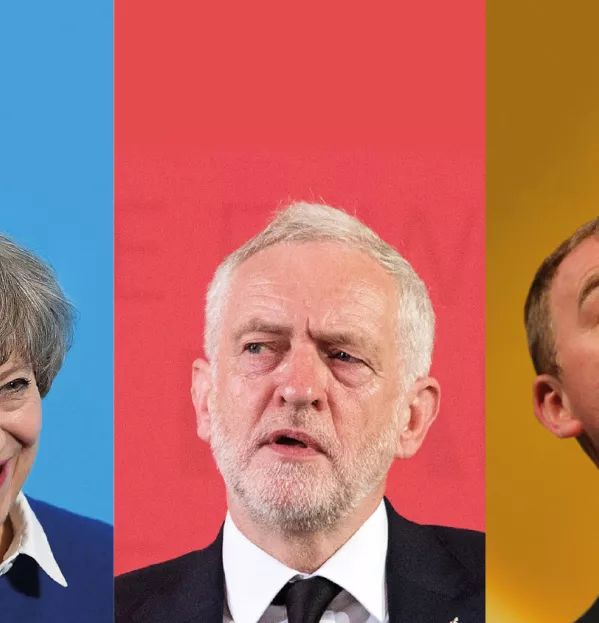Your guide to the three main parties’ plans for schools in England

Conservatives
• Lift the ban on new grammar schools.
• Ban councils from creating any new places in schools rated “inadequate” or “requires improvement”.
• Ensure at least 100 leading independent schools will become involved in sponsoring academies or founding free schools.
• Review the school admissions system, but rule out a “mandatory lottery-based school admissions policy”.
• Improve schools’ accountability at key stage 3.
• Expect 75 per cent of pupils to be entered for the EBacc by 2022, rising to 90 per cent in 2025.
• Ensure all children have access to “an academic, knowledge-rich curriculum”.
• Give teachers greater support in preparing lessons and marking - including through the use of technology.
• Scrap free school meals for all infants, and introduce free school breakfasts for every child in primary school.
Labour
• Ensure all schools are “democratically accountable, including appropriate controls to see that they serve the public interest and their local communities”.
• Require joined-up admissions policies across local schools.
• Commitment to class sizes of less than 30 for all infants, and “seek to extend that as resources allow”.
• Extend free school meals for all primary school children.
• No reintroduction of baseline assessments.
• Launch a commission to look at curriculum and assessment, starting with KS1/2 Sats.
• Remove the public sector pay cap.
• Tackle rising teacher workload by reducing monitoring and bureaucracy.
• Consult on introducing teacher sabbaticals and placements with industry.
• Stop schools paying the apprenticeship levy.
• Schools-based counselling for all schools.
• Embed SEND training “more substantially” into training for teachers and non-teaching staff.
Liberal Democrats
• End the 1 per cent cap on teachers’ pay rises.
• Guarantee all teachers in state-funded schools will be fully qualified or working towards qualified teacher status from January 2019.
• Introduce a “clear and properly funded entitlement to genuinely high-quality professional development” for all teachers - 25 hours per year by 2020, rising to 50 hours by 2025.
• Create an independent Education Standards Authority to pilot, phase in and resource future policy changes in consultation with professionals and experts.
• Reform Ofsted inspections to include a focus on longer-term outcomes, teacher workload, sickness and retention.
• Establish a Foundation for Leadership in Education to promote high-quality, evidence-based leadership.
• Give local authorities clear responsibility for local school places planning.
• Repeal the rule that all new state-funded schools must be free schools or academies.
• Allow Ofsted to inspect both local authorities and academy chains.
• Introduce a slimmed down core national curriculum for all state-funded schools.
• Create an Education Standards Agency with responsibility for the curriculum.
• Prioritise primary progress measures instead of floor thresholds.
• Work with the profession to reform tests at 11, preventing curriculum narrowing in upper KS2.
• Make promotion of wellbeing a statutory duty of a school, and part of the Ofsted inspection framework.
• Extend free school meals to all children in primary education.
How the parties’ plans will affect school funding
The Conservatives have pledged to increase the overall schools budget by £4 billion by 2022.
But the Institute for Fiscal Studies (IFS) has calculated that once rising costs and pupil numbers are taken into account, this would amount to a 7 per cent real-terms cut between 2015-16 and 2021-22 - the biggest fall in school spending per pupil in 30 years. Between 2017-18 and 2021-22, it would equate to a 3 per cent real-terms cut in per-pupil spending.
By contrast, Labour’s plans would increase real-terms per-pupil spending by 6 per cent between 2017-18 and 2021-22, while the Liberal Democrats would keep spending per pupil frozen in real terms during the same period, according to the IFS.
However, these figures do not take account of the potential for the 1 per cent cap on public sector pay increases to be removed.
Increasing public sector pay in line with private-sector earnings - which Labour supports - could increase schools’ costs by £2.8 billion in 2021-22, IFS researchers have found.
The Lib Dems want to increase pay in line with inflation, which could cost schools £1.6 billion.
All of the parties have promised that no school will lose out under the planned national funding formula for schools, which the IFS has said would cost an additional £350 million a year.
You need a Tes subscription to read this article
Subscribe now to read this article and get other subscriber-only content:
- Unlimited access to all Tes magazine content
- Exclusive subscriber-only stories
- Award-winning email newsletters
Already a subscriber? Log in
You need a subscription to read this article
Subscribe now to read this article and get other subscriber-only content, including:
- Unlimited access to all Tes magazine content
- Exclusive subscriber-only stories
- Award-winning email newsletters



